Hi ho, hi ho, it’s back to Birmingham we go.
Specifically it’s the final programme meeting at Maple House with all the projects and professional associations from the Jisc digital literacies programme.
The first thing that struck me was a wave of nausea and terror as I alighted my train at an entirely unfamiliar station. But no, I hadn’t caught the wrong train after all. It’s the first phase of the New Street Redevelopment. A quick poll at the start of the day revealed the majority of attendees had the same reaction.
The agenda is all about reflection and consolidation.
First off we ran a ‘lessons from across the programme’ session lead by the projects. Here the lessons learned need to be;
Specific – what we know about developing digital literacies in different contexts
Make a difference – to decisions people make, not just bland generalisations
Are not obvious – what we now know we couldn’t have guessed. The format was plenary from project lead followed by group discussions then feedback via post it notes.
The following are based on 2 minute pitches so little time for me to add reflections!
First off we had the Bath PRIDE project on Digital Literacies in the Disciplines noting;
1. Work within existing culture
a. Embed what you do in existing processes
b. Link to CPD
2. Language
a. Disciplines have their own language
b. Allow disciplines to define what they mean by digital literacy
3. Balance
a. Instituional
b. Deopaertmental
c. Individual
4. Support / Development should be localized
a. 50% generic, 50% subject specific but;
b. Utilise the external perspective as well!
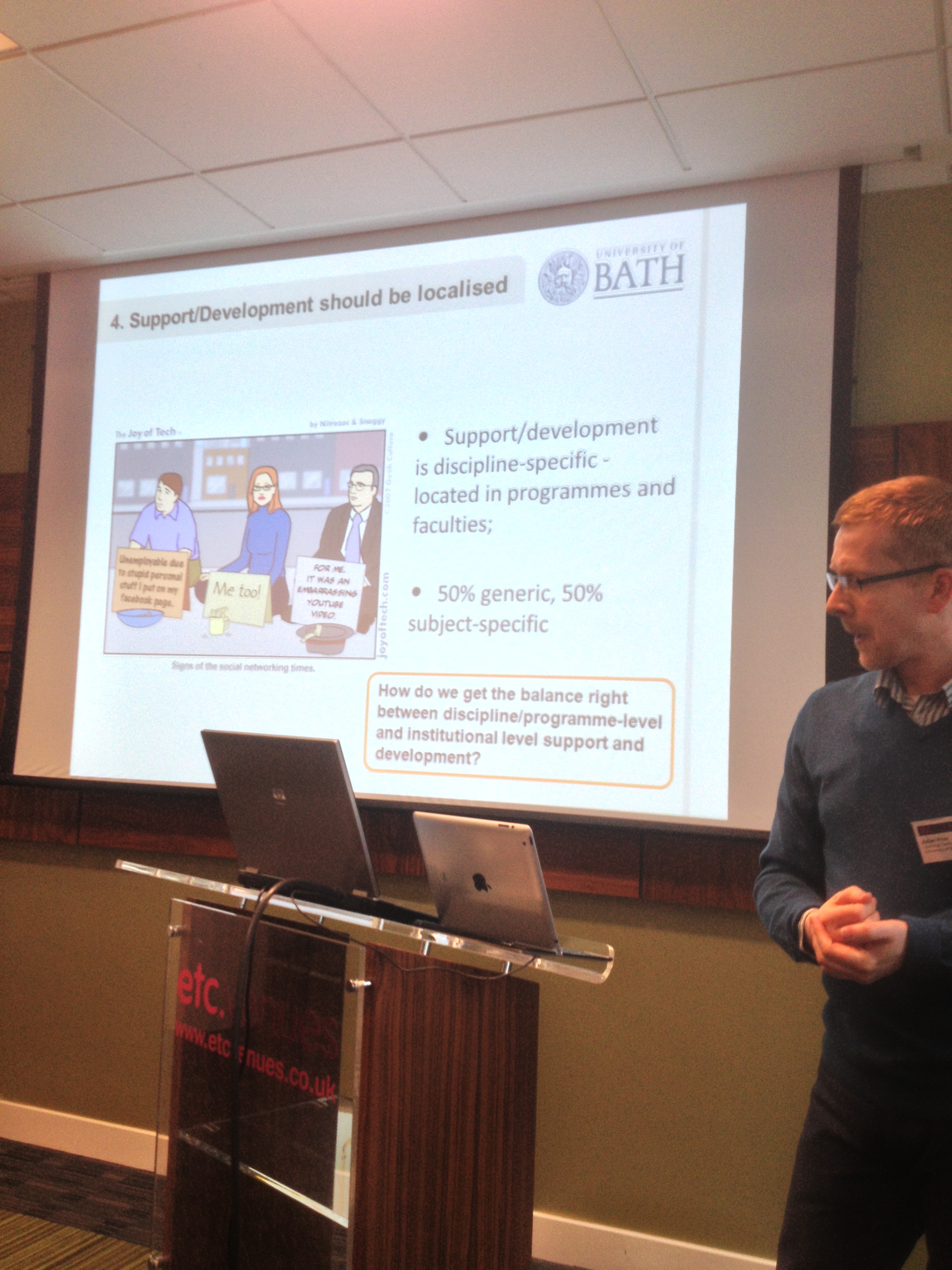
And the results from the group discussion
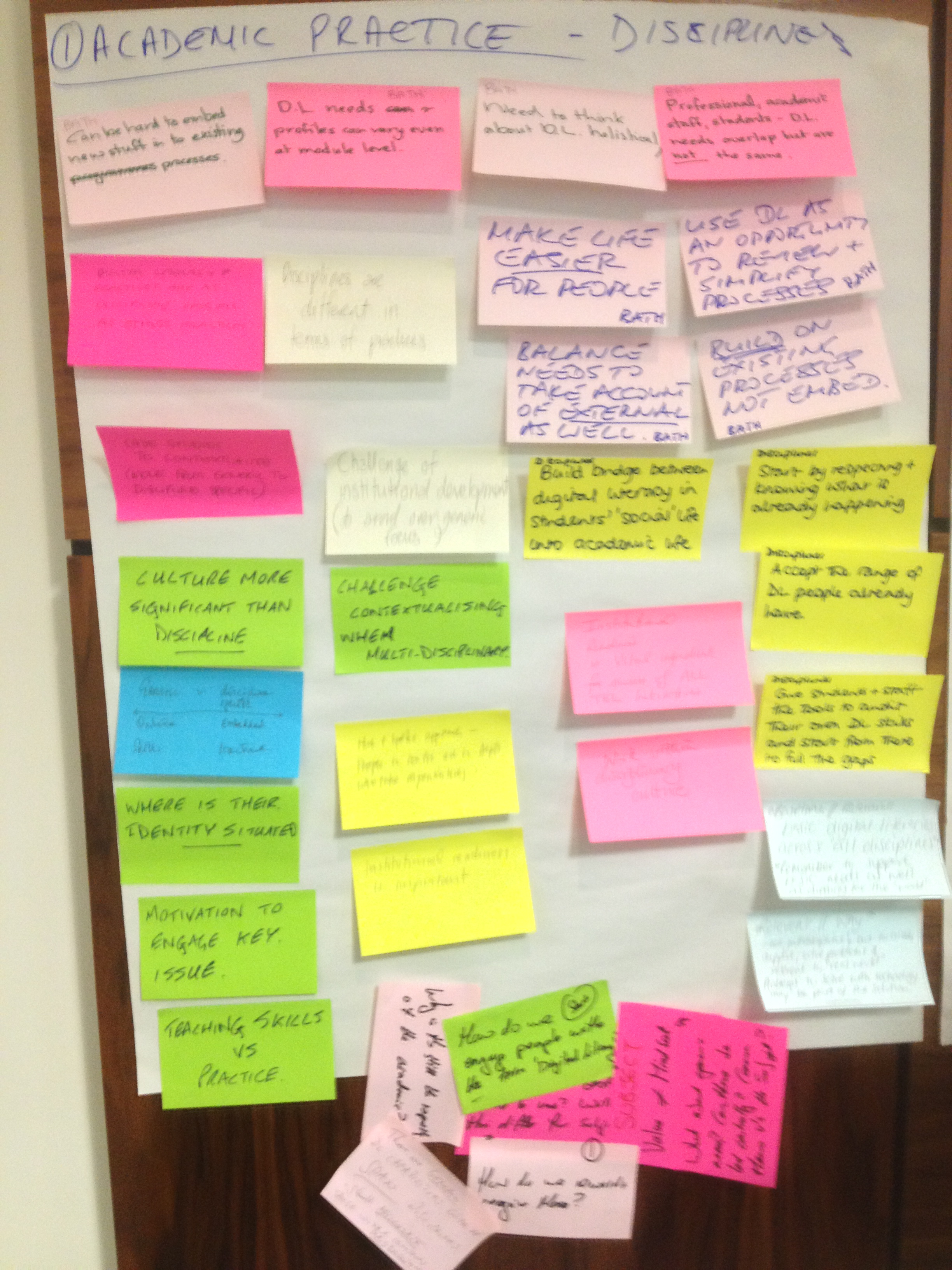
Next up Reading on Digi Lit for Employability
No slides for this one unfortunately and the speaker had laryngitis!
Students are keen to develop online identity but require guidance
Employers need specific language to engage and can be easily alienated. They can help identify the skills required
Students rely on academic staff to gain the skills BUT academic staff don;t necessarily have those skills themselves
Key is how we engage students to develop the employability skills in year one rather than as seems to be the case leaving things to year 2
No take here on Alumni which I found unusual. There’s a section on Employability in our new (Feb 13) Relationship Management InfoKit as well as one on Alumni
And the results from the group discussion
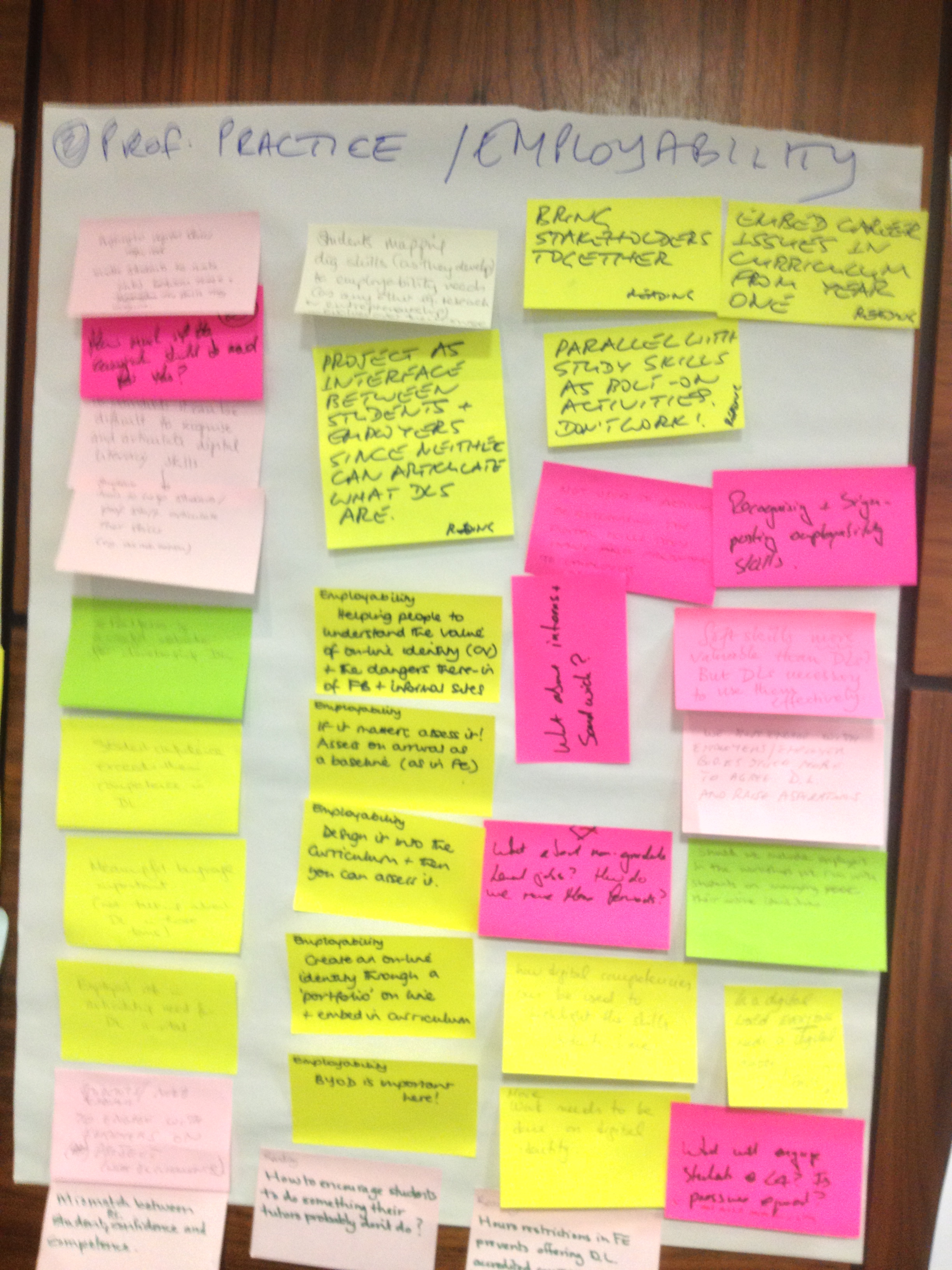
Next up Assessing and Progressing digital literacy
Lots of slides and little time so reproduced those below.
First we have a slide on student journey for digital literacy
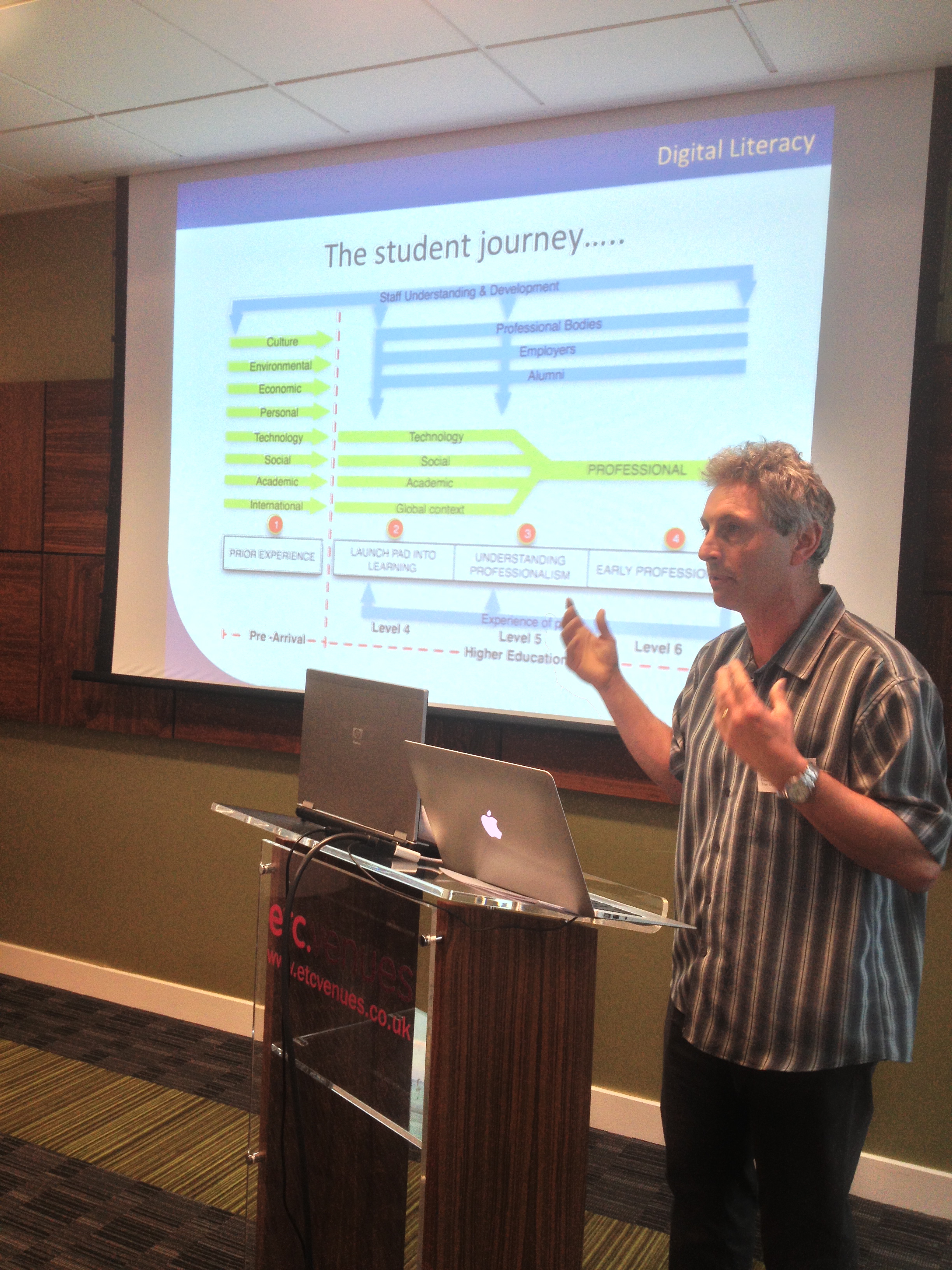
And a highlight on the Exeter student and researcher self diagnostic quizzes http://bit.ly/learnerquiz and http://bit.ly/researcherquiz

Lots of knowledge and challenges
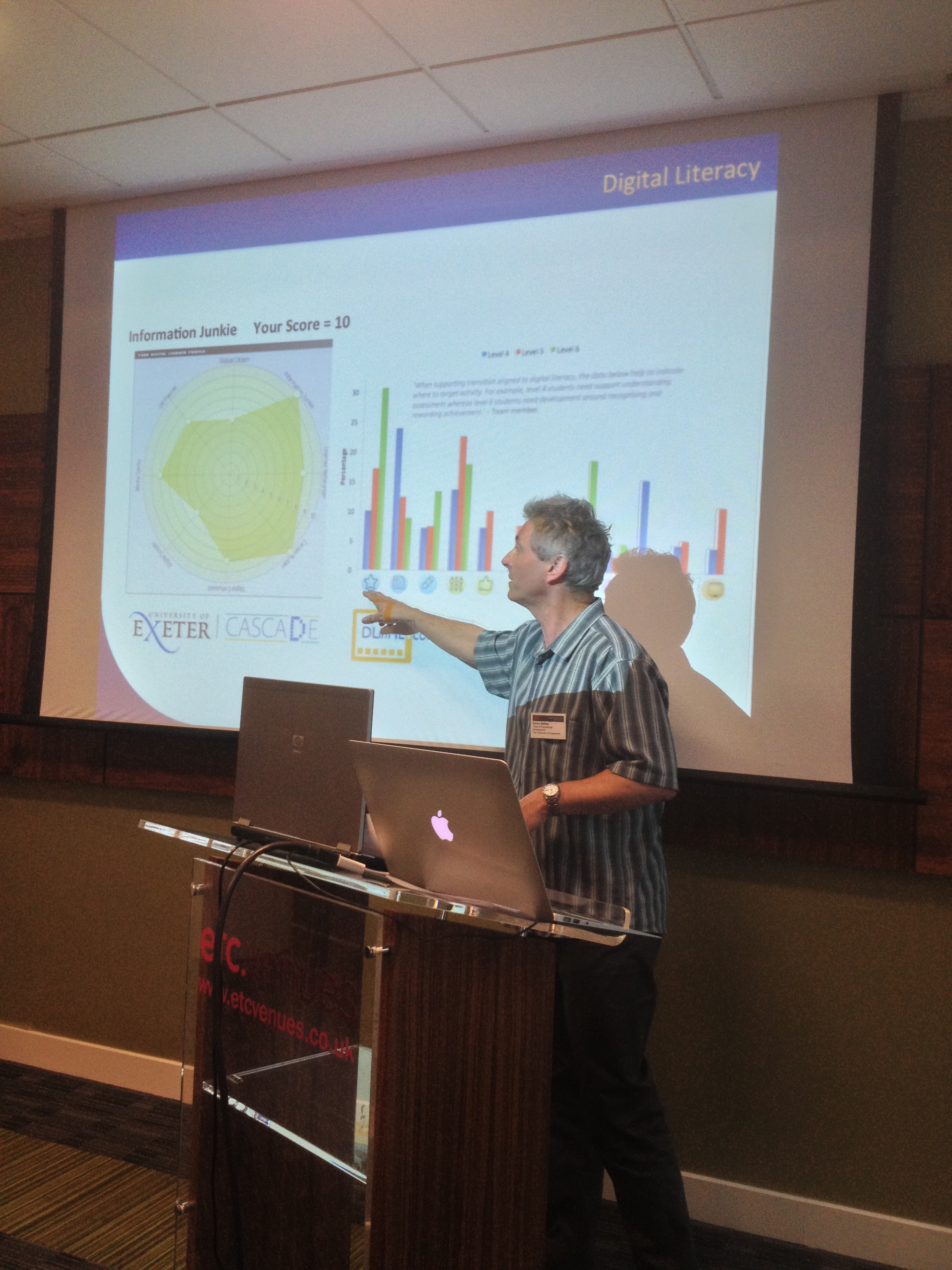
Note that employers speaking a different language – how do we embed their needs into the curriculum identified again. I wander how people are doing this – alumni, placement and more no doubt in the post it session.
Last slide here was about rate of change and thinking 5 years ahead
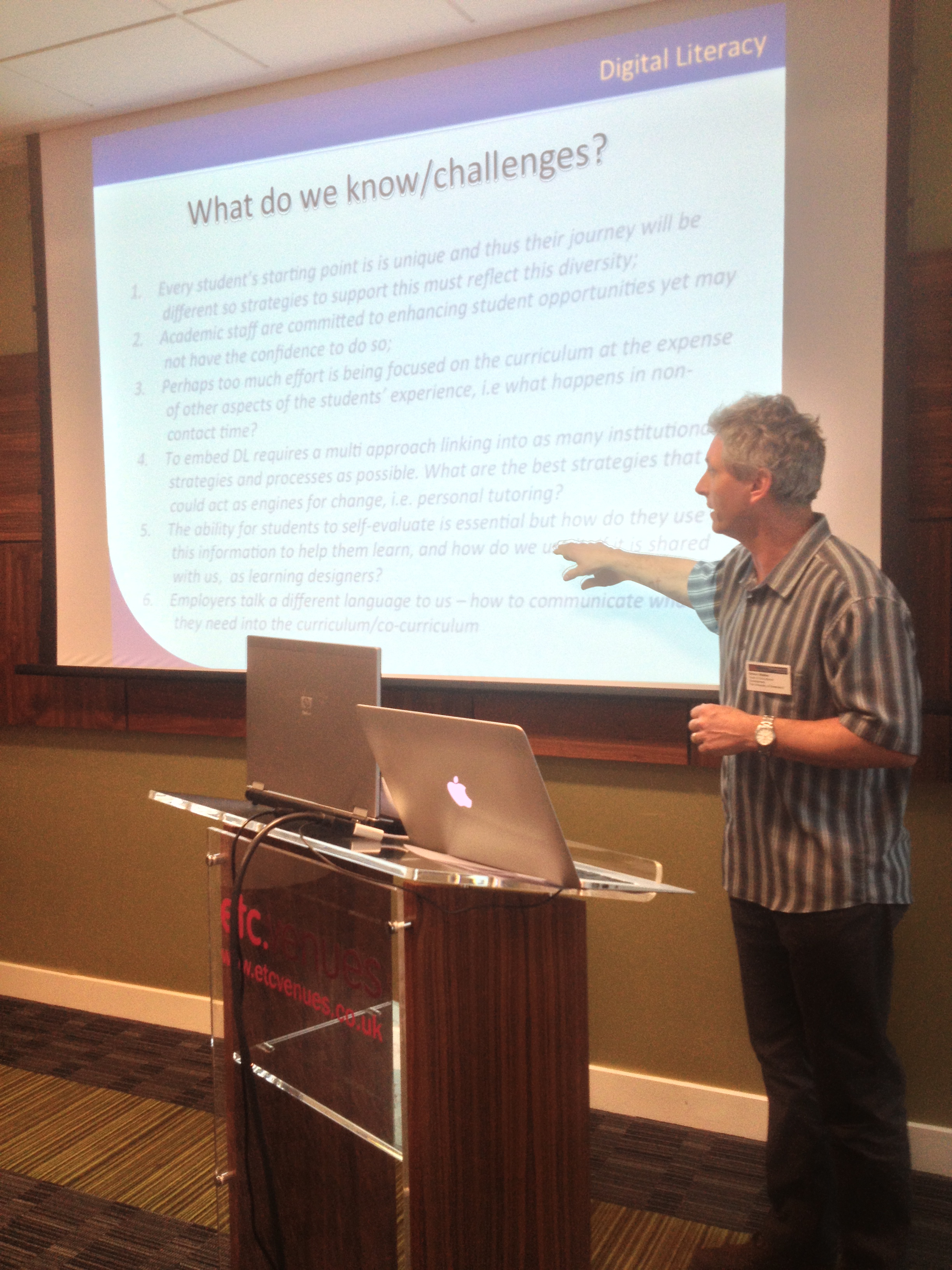
and a comment from the floor regarding the qualities students need to cope with the next 50 years of employability. So instilling the skills to be competent and confident to embrace new technologies and techniques. Richard Francis brought up the notion of technology detox – students must eb able to determine when they don’t want / need to use particular technologies. Also a comment that comes up time again in the conversation I’ve been having recently – student have an elevated self perception of their own abilities and confidence in digital literacies. So interventions to help them realise this are effective.
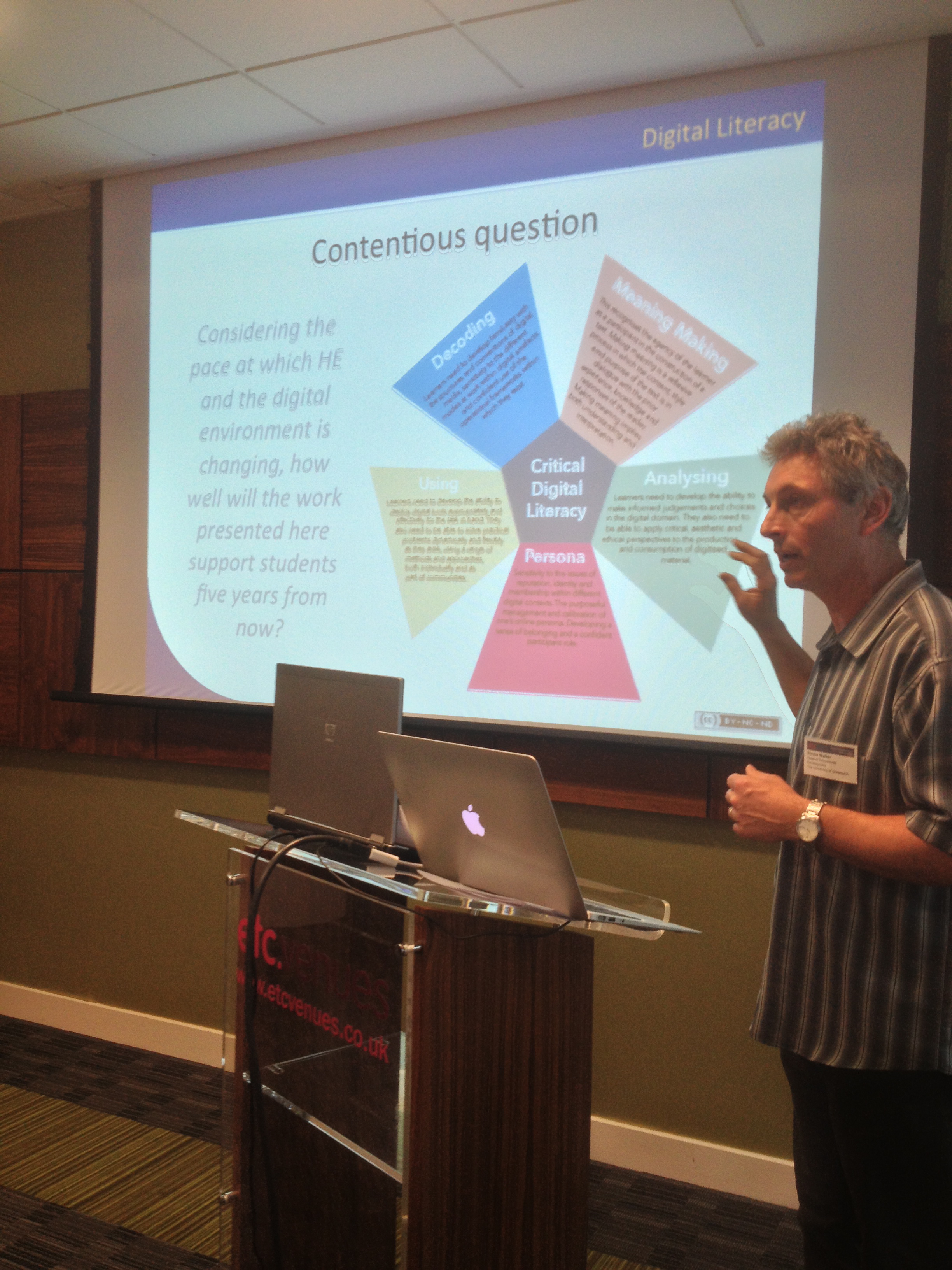
And the results from the group discussion

Next up Richard Francis from Oxford Brookes on Students as Pioneers
Key stuff this in my opinion in terms of successes from the programme
Richard highlights care must be taken that student engagement doesn’t become market research. Key messages in the slide below
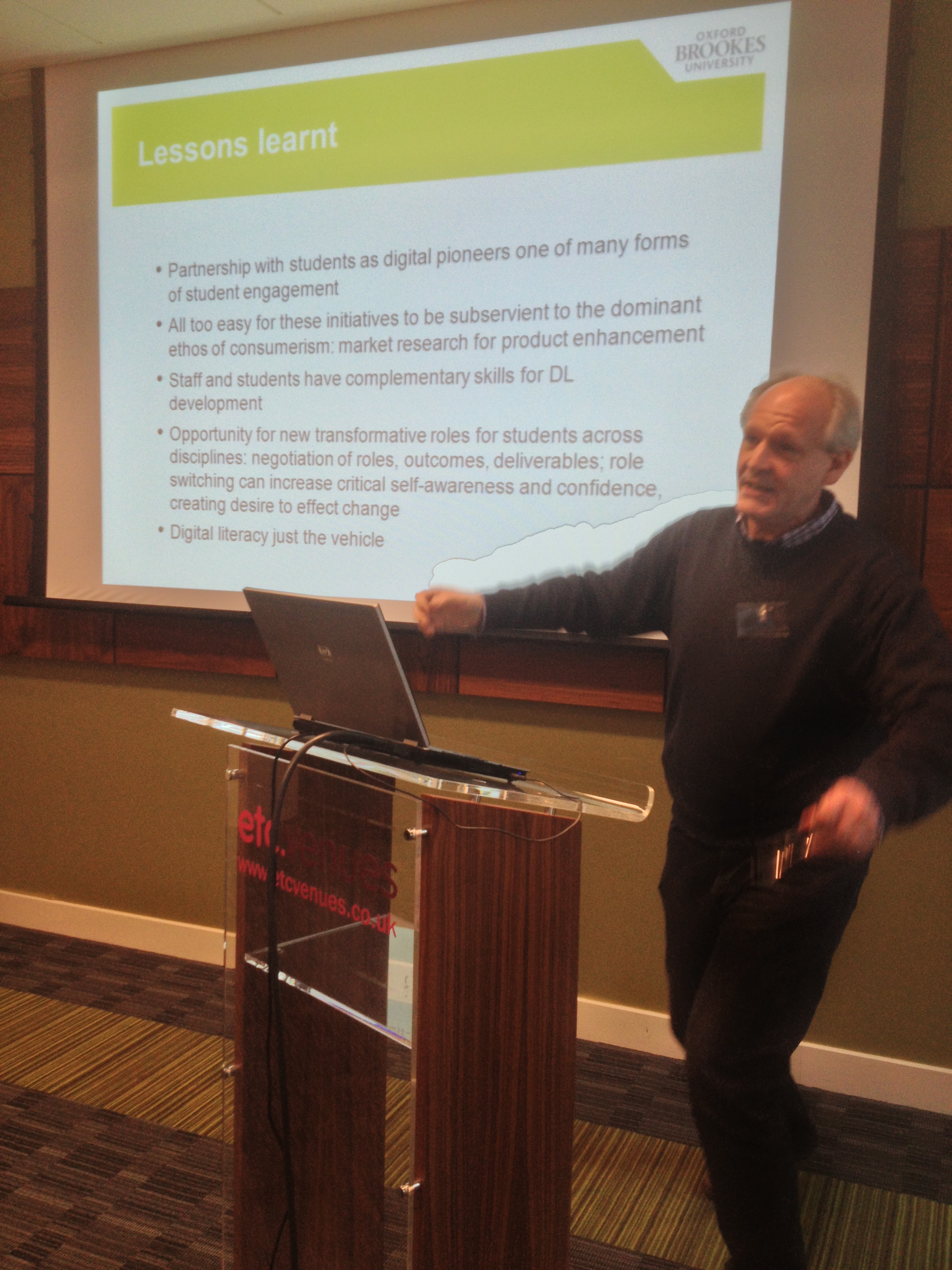
Richard poses the questions whether to pay students for involvement or voluntary approaches
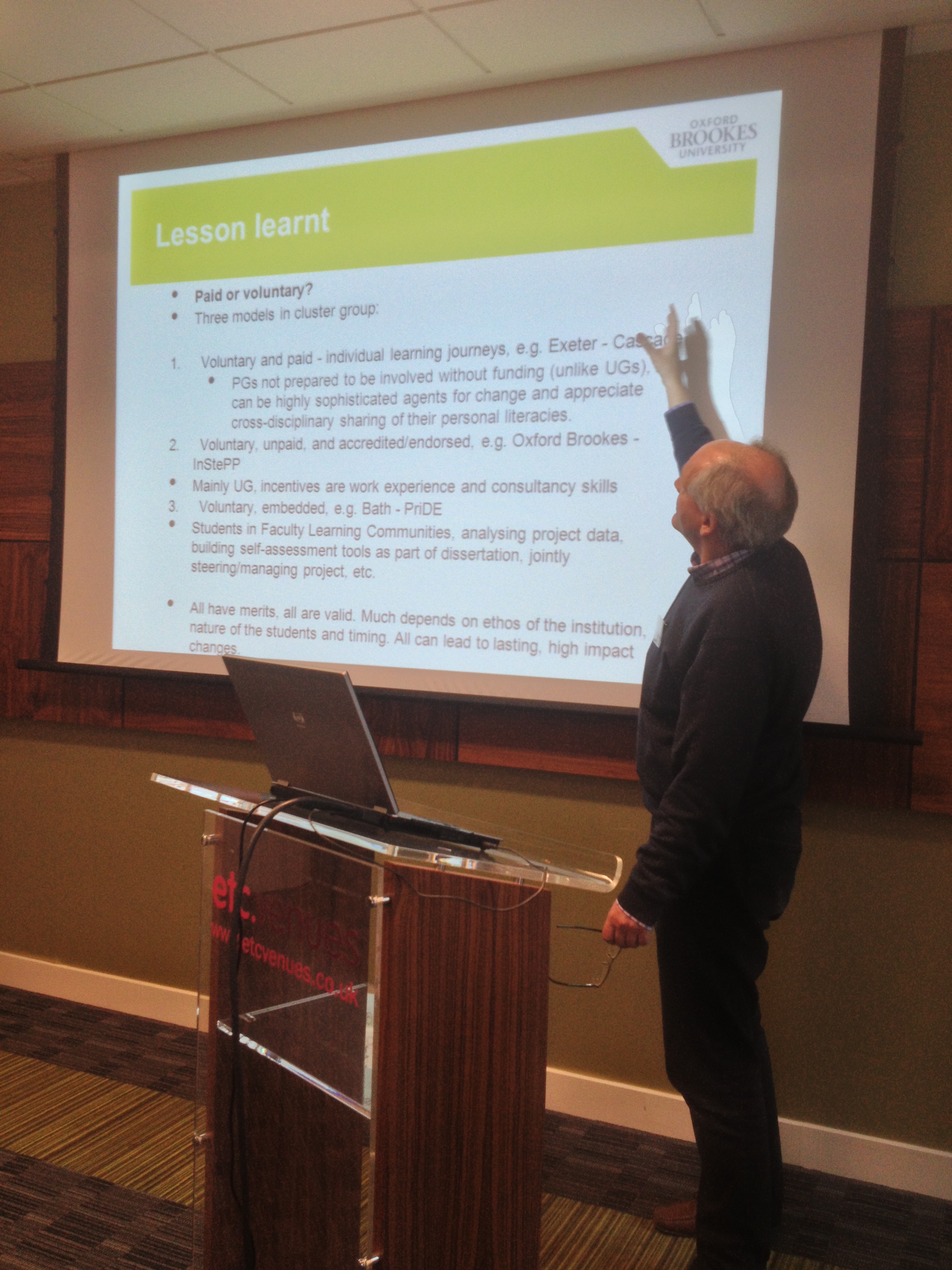
Horses for courses but here are the lessons learnt:
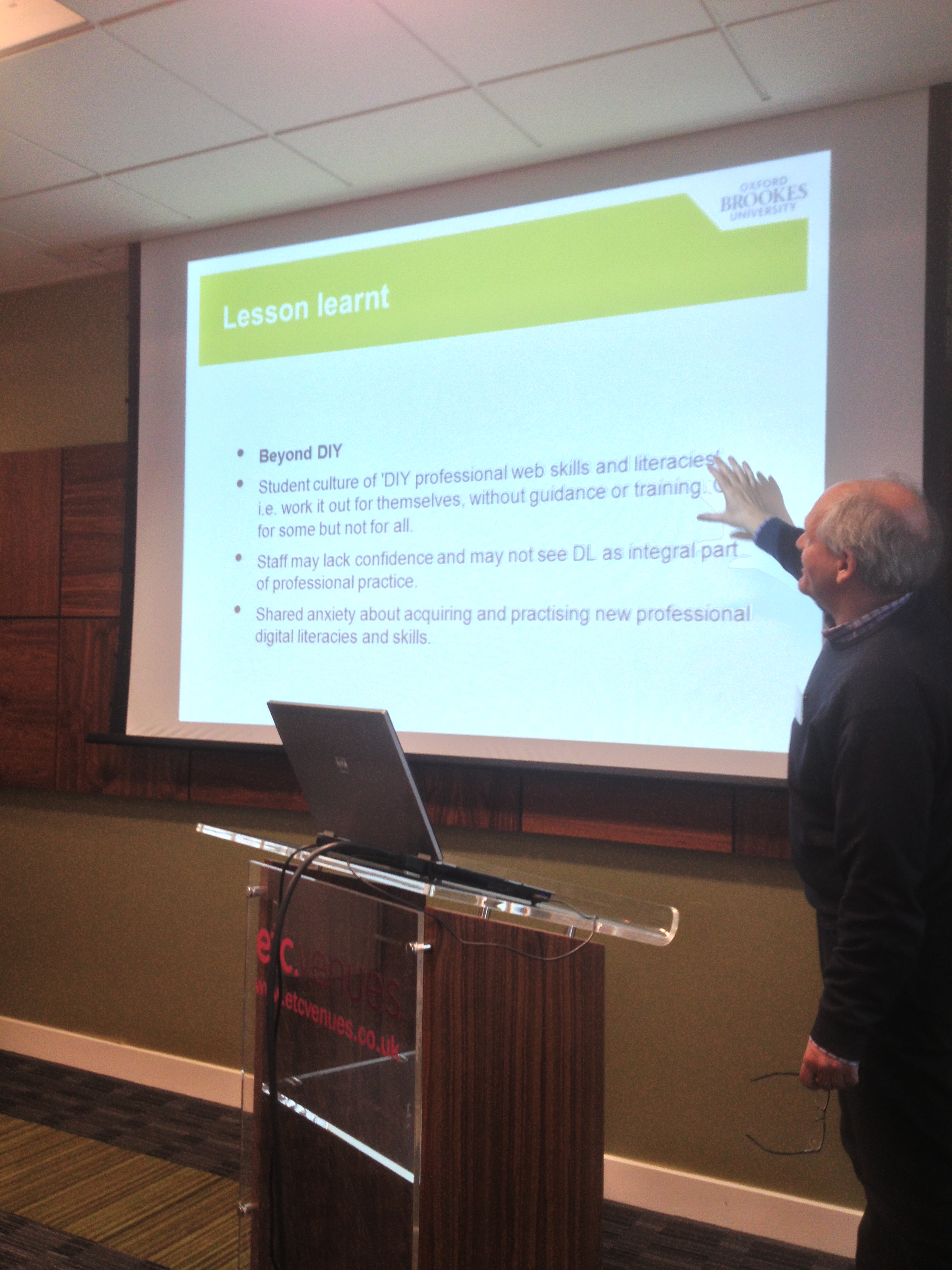
Noting that students are individuals and this needs to be recognised in approaches taken. Also that the process of students as change agents needs to meet the expectations of the students themselves in terms of what they want to get from the process.
And the results from the group discussion
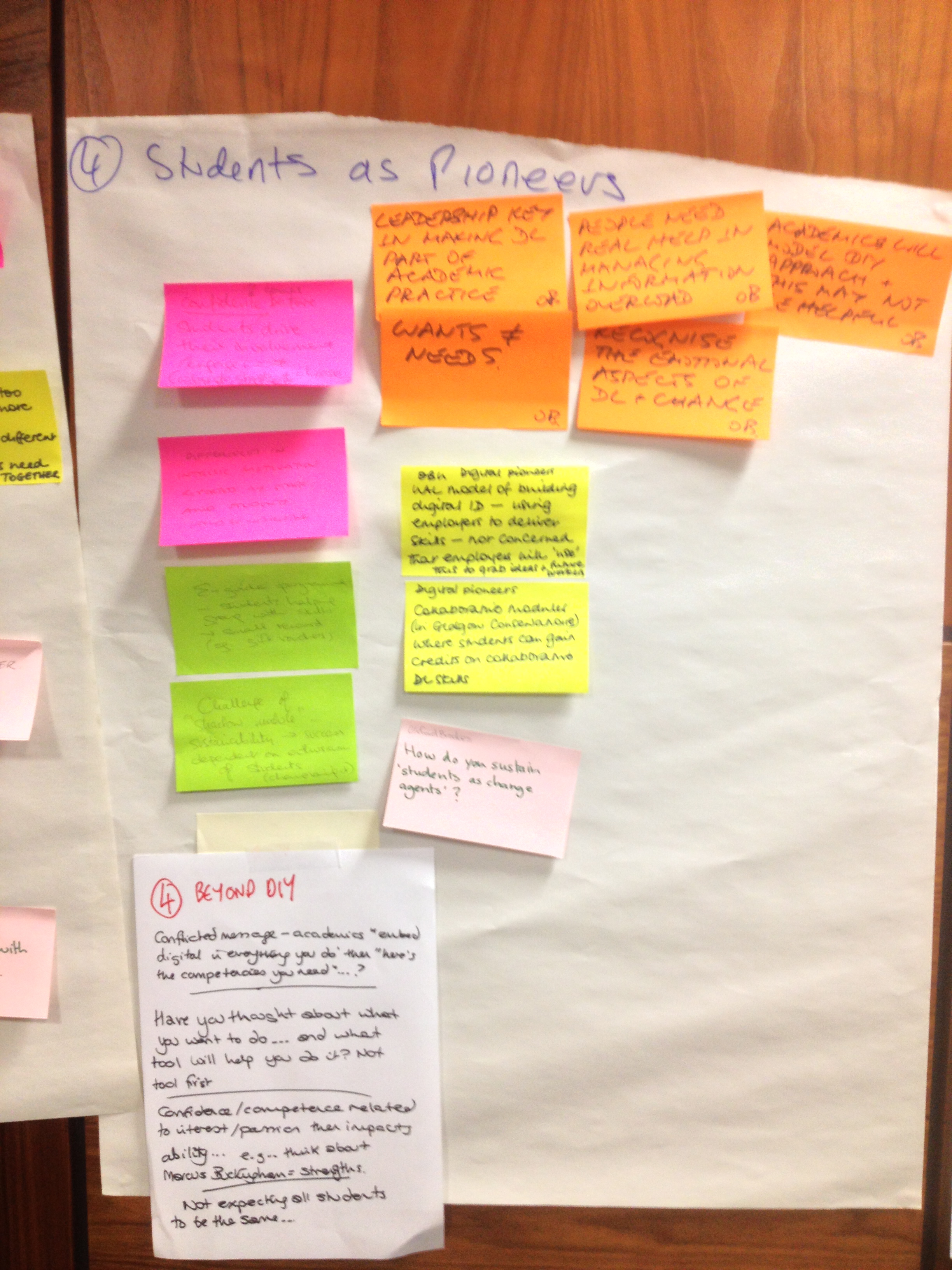
Next up Andrew Comrie describing lessons from his project cluster
Lots of words to these slide so reproduced below.
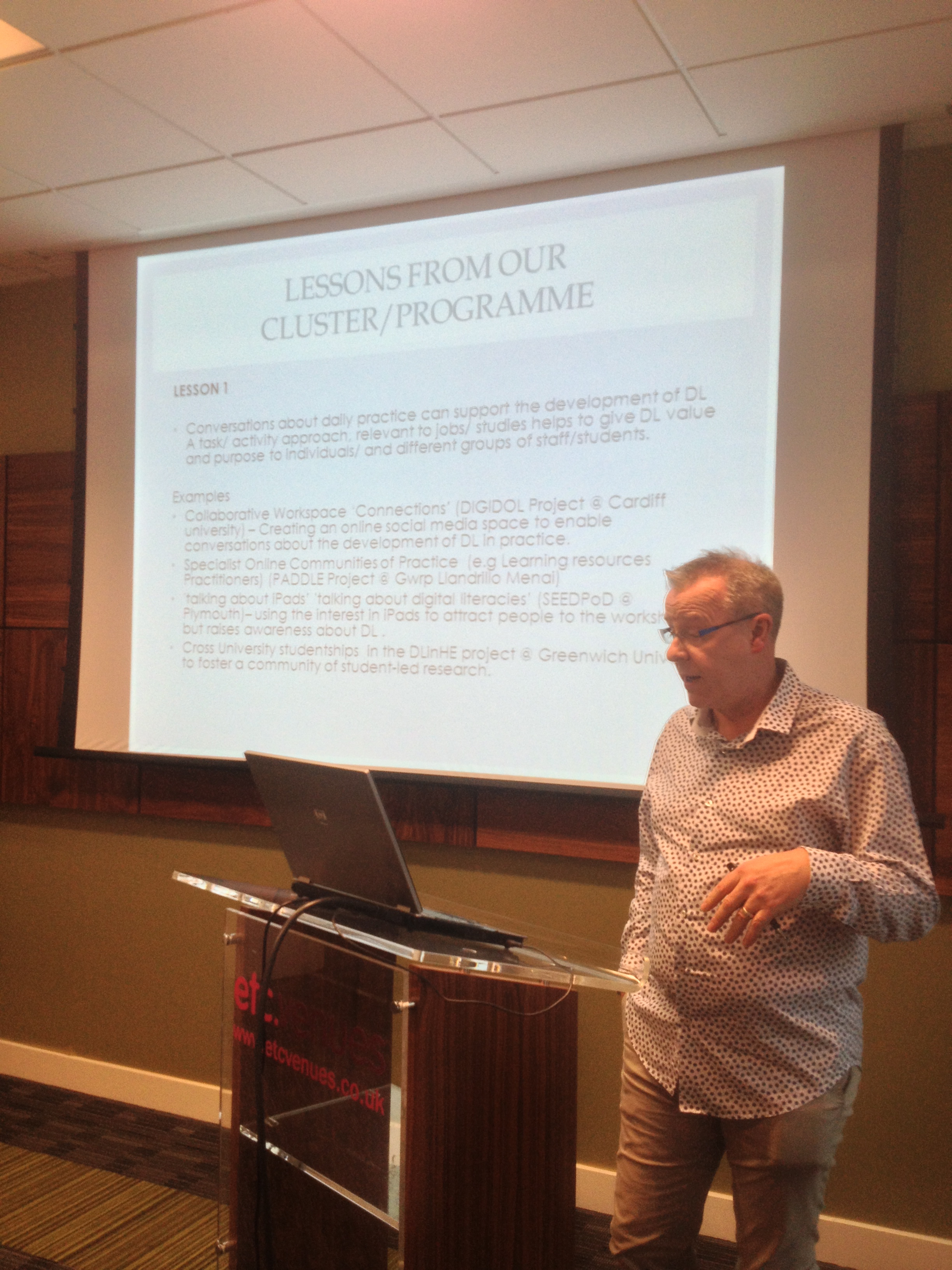
Lesson 2 was that no particular method works for all occasions
Lesson 3 reproduced in the slide
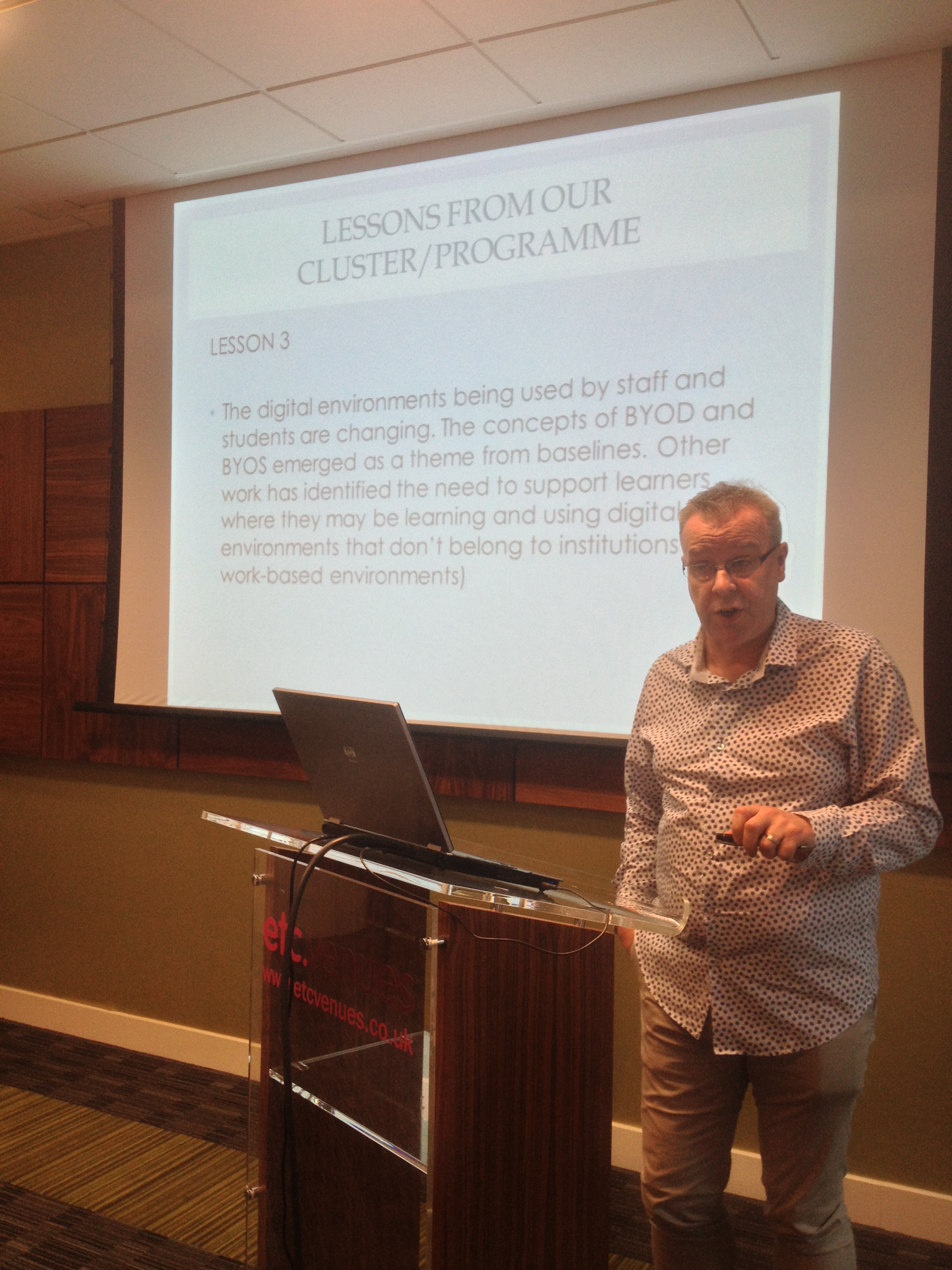
Key question was online identity and bring your own device

More lessons from Andrew, same caveat – verbose slides, 2 minute pitch, live blog is limited to pictures!
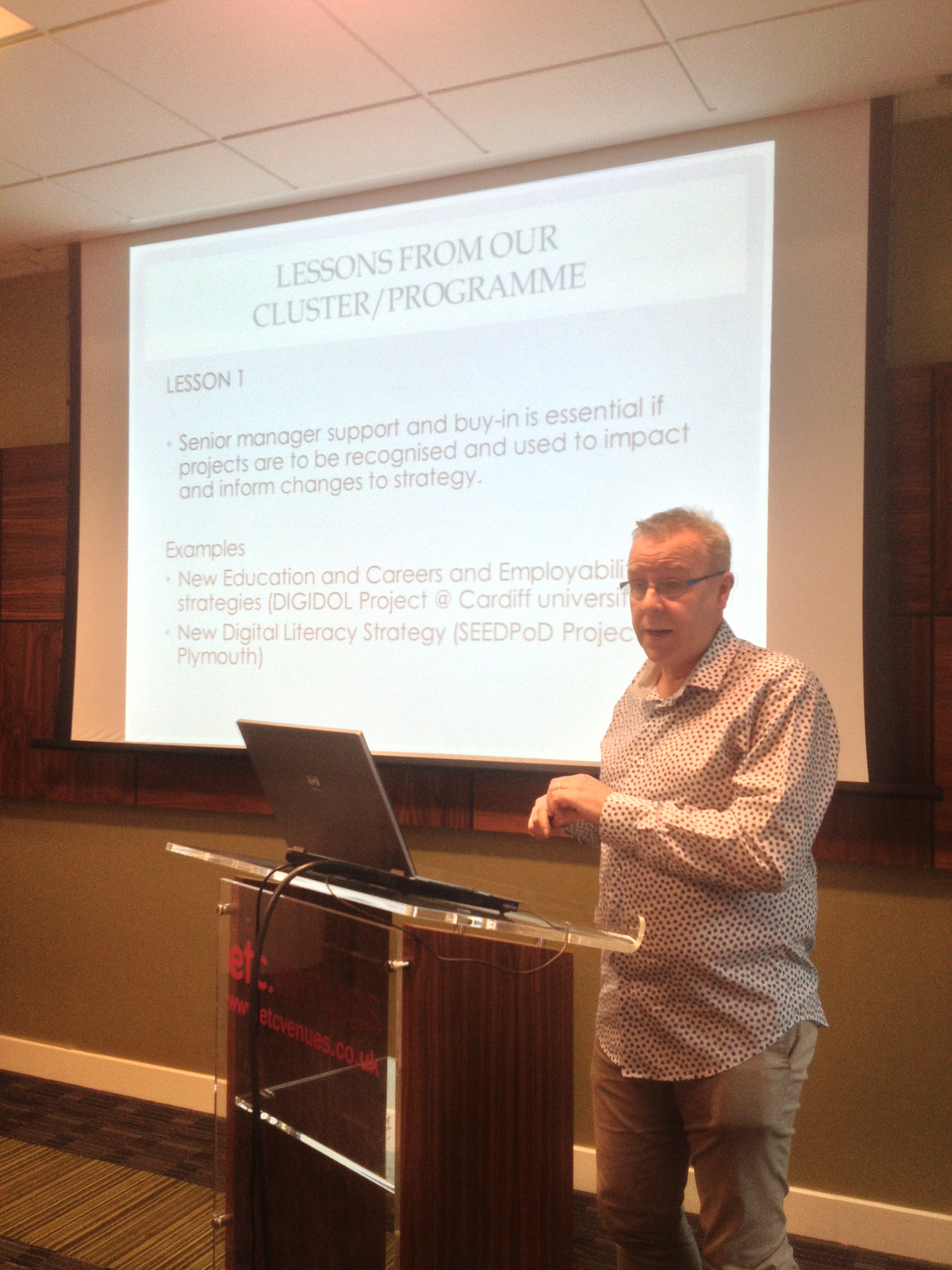
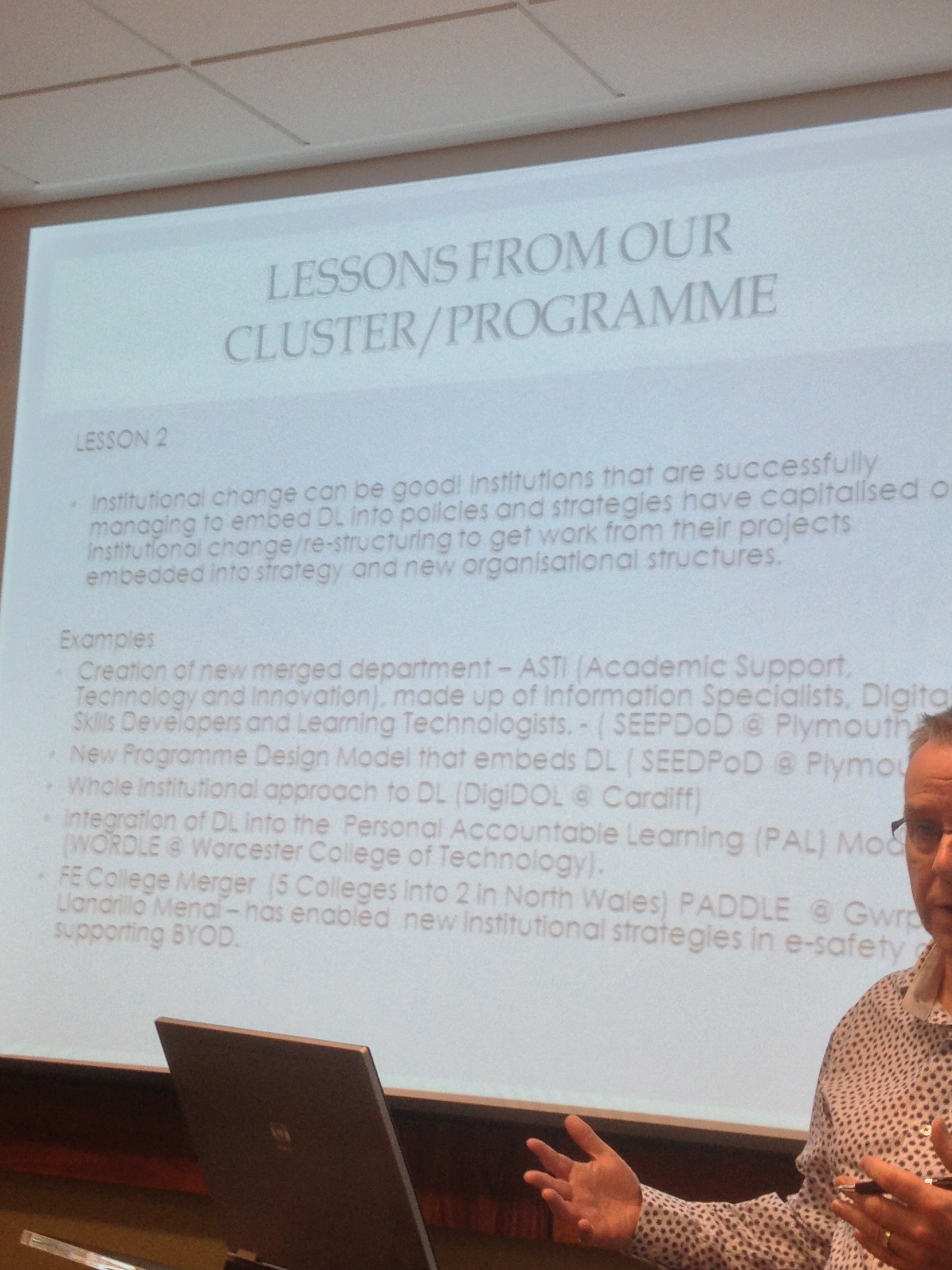
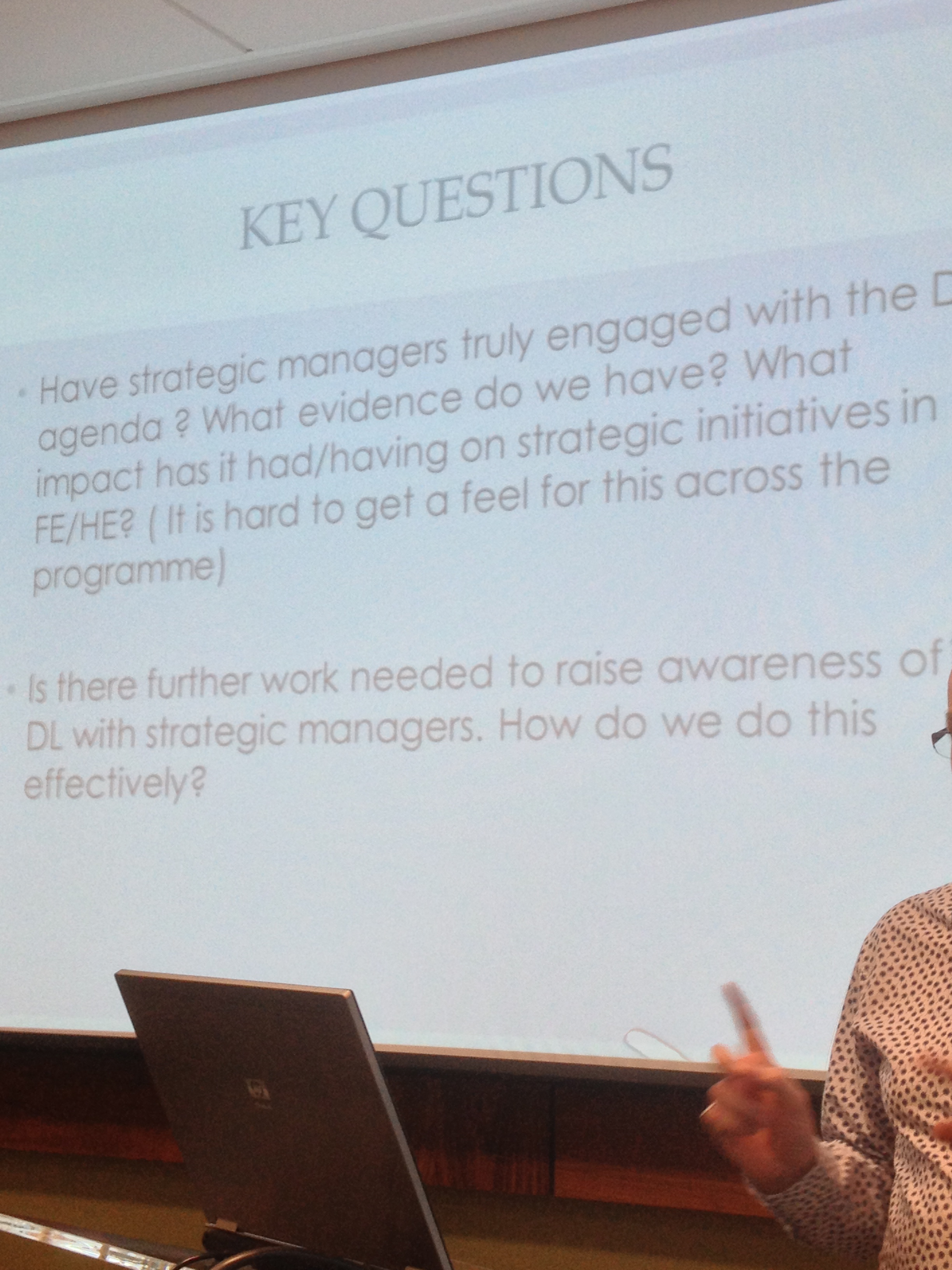
Notes little evidence of digital literacies for strategic managers – but we have a session on that later in the day so may be able to challenge it.
And the results from the group discussion
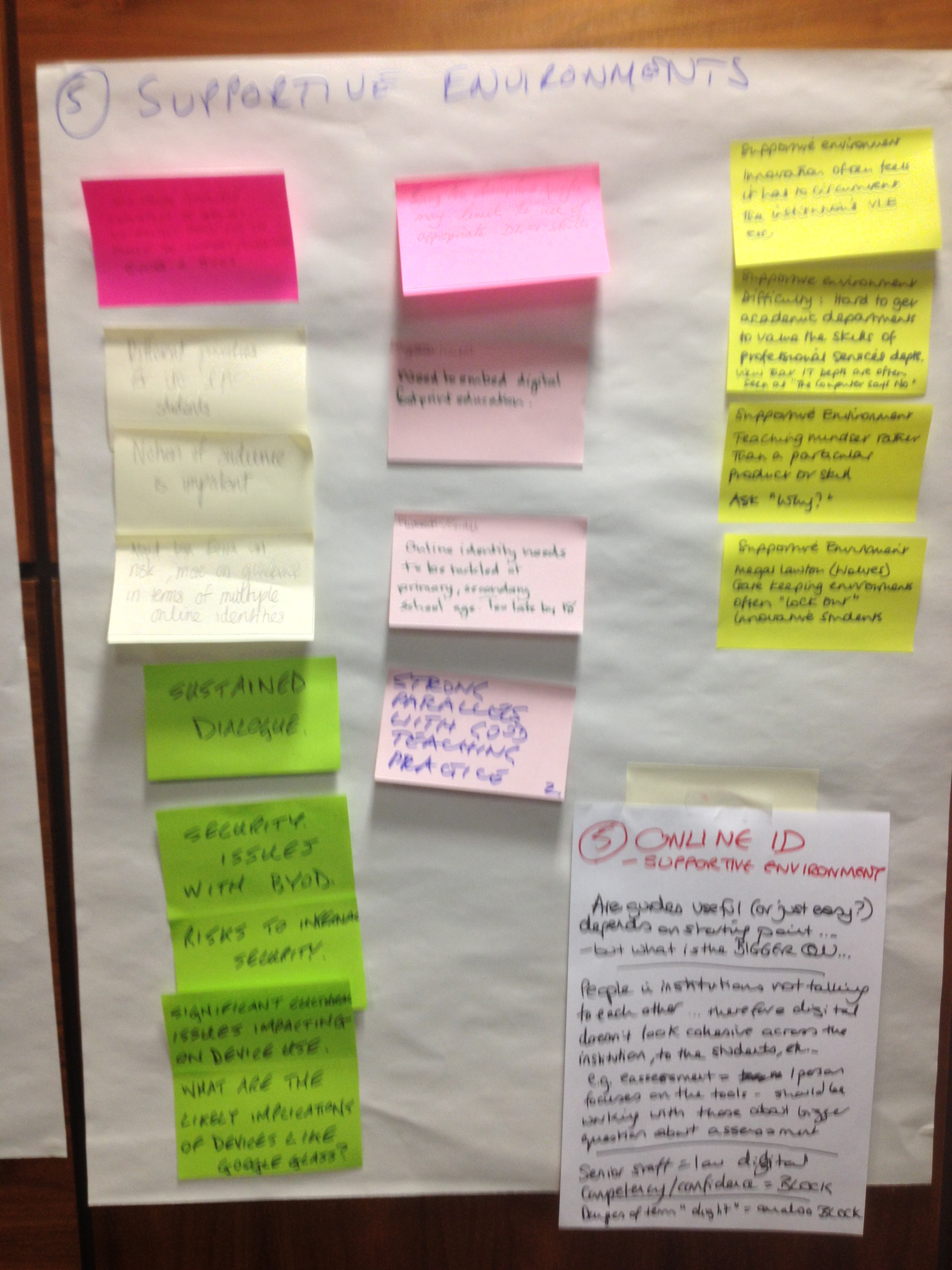
Session Closes
We’re now spending some time in group work. Each table has a theme pertaining to a ‘resource kit’ or ‘box’. Attendees are going to circulate and add resources to each or identify gaps. We split the group into ‘residents’ (explaining what’s on offer and what’s needed) and ‘visitors’ (offering new insights etc).
The themes were
Curriculum staff
Digital scholars and researchers
Graduates and employability
Digital Pioners
Managers and strategists
Those developing own digital literacies
Rather than post photos of the post it notes I’ll link to the Jisc Design Studio Digital Literacies Resource Kits page where the findings will appear.
Breakout sessions next and I’m attending Peter Chatterton discussing Digital Enquiry and Employability.
Peter notes that;
In SMEs / Employers
Senior Managers and those Directing IT need to work more closely with exemplary graduates
In HEIs
Digital Enquiry (Horzon scanning, trend spotting and then application in an academic context). Digital innovation (via problem identification and problem solving) and Digital Influence (the power to influence stakeholders so a focused area of communications and stakeholder persuasion) are the areas we should be teaching.
By providing graduates with these qualities and the confidence to apply them, success in employment can be enhanced
Asking employers what they want / need in terms of digitally literate (and capable) graduates is therefore non-trivial. Raising company aspirations is important. So HEI relationships with employers is the area this falls into. Working more strategically and in partnership with employers is a key area for development and rich in terms of benefits to all parties be they HEIs, Students or Employers.
So where the Jisc Digital Literacy Programme has identified and operationalised partnerships with students as change agents Peter is proposing a similar approach for graduates in employment. Intersting also that Peter highlights a divide between commercial business leaders and ICT leaders much as Jisc and the Leadership Foundation identified when we looked into Strategic Approaches to Technology and built the Strategic ICT Toolkit.
Engaging the Unengaged – Andy Wilson and Rebecca Radics on behalf of the Staff Development Forum.
I dropped into this parallel session part way through and reproduce below the findings as documented by Rebecca Radics



Sian PVC(T) New Buckinghamshire University
Shan talked us through her own journey on developing digital literacy as well as reflecting on the impact of the Jisc programme. Shan Skpyed into the room and shared her desktop to present her slides.
Here are the Immediate Goals she identified for the two arts based projects she’s been involved with in the programme
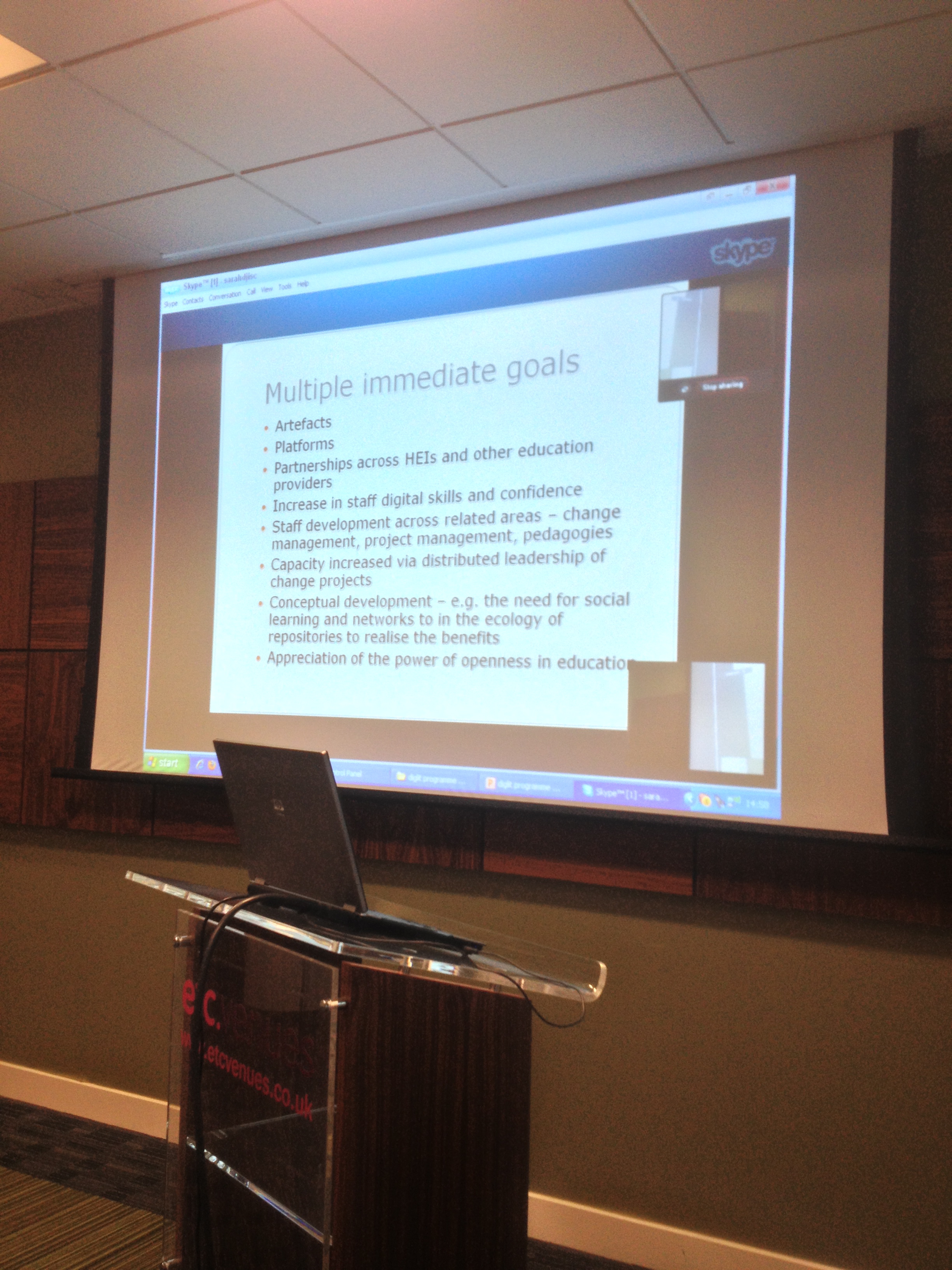
Shan went on to outline longer term impacts (such as leadership enhancements) and these struck me as the sorts of benefits one tends to see from programmes rather than projects. Next Shan introduced the concept of ‘super complexity’ and argued that these issues are now widely felt. Programme level benefits realisation came through again here personified in the second bullet as disparate join up of infrastructure.
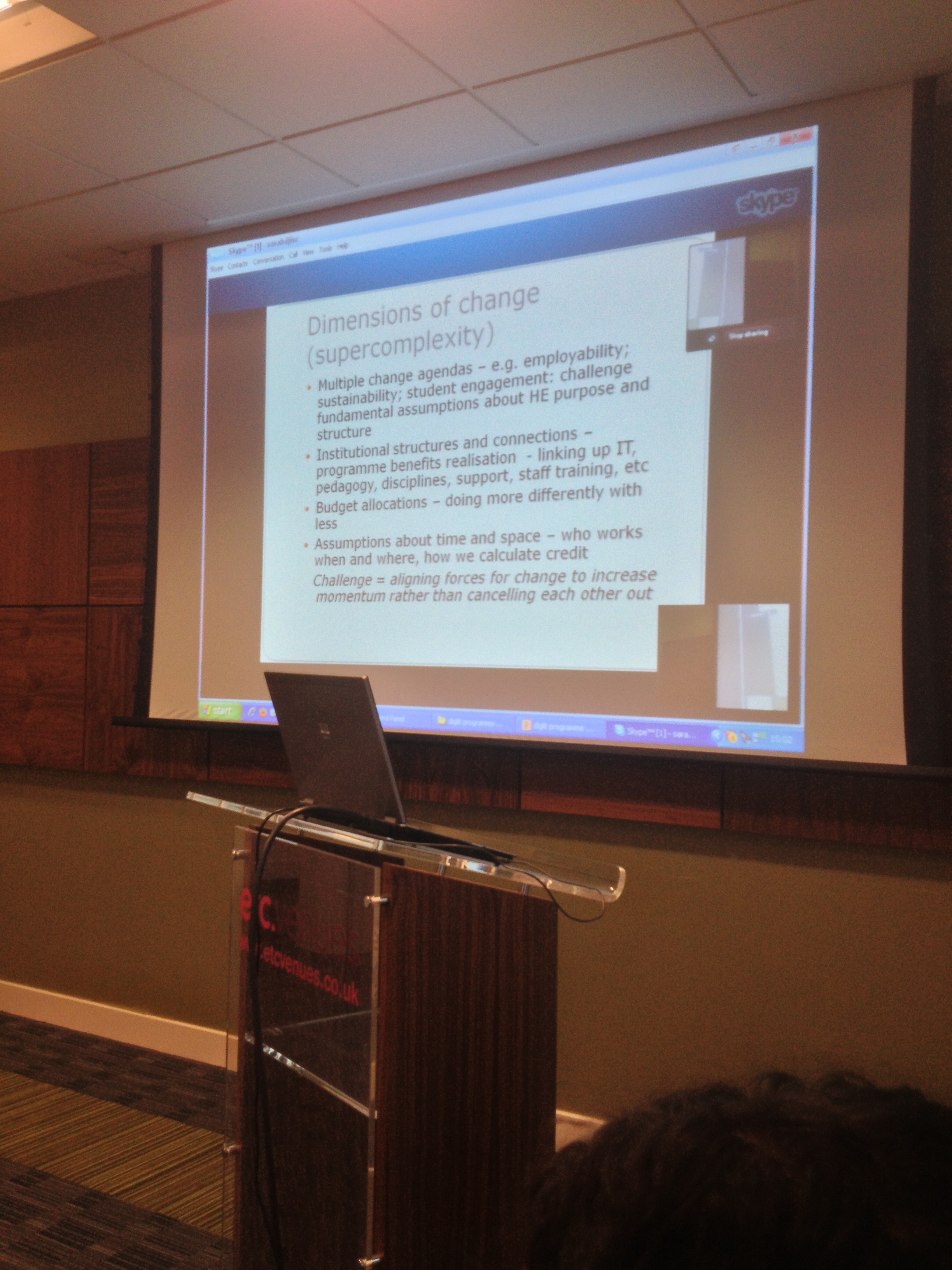
Balance was introduced next, a nice slide showing the sorts of ‘offsets’ we’re aiming to achieve for success in the digital literacy arena.

Shan described ‘outrageous ambition’. A concept at New Buckinghamshire involving the development and definition of the vision of a future we wish to step into. Impact has been beyond digital literacies and a nice presentation showing how we can impact positively on strategic vision through longer term programmes of change. Long live Programme Management.
Associations Strand Project Report Session
I made the suggestion to the association strand projects that we have a short session to co-design their final report / case study. As one might imagine, views were mixed! We left it that we’d have a week to reflect but it seemed most likely that we allow each to amend the template the projects are using to address their own needs. We identified the following suggested amendments.

Jisc would like to see evidence of impact and benefits on associations, individuals and externals. We’re also keen to hear ‘how was it for you’ in terms of experiences of working with Jisc in this manner. If associations presented this as a case study we could share with others that would be helpful. If there are confidential aspects associations would wish to share with Jisc these may be added as an appendix or marked as such and will be redacted prior to publication. Associations are reminded that the outputs are for their own benefit as well as that of the wider sector and that Jisc wishes to uncover evidence of the value or lack thereof in engaging such that we might learn from and refine the process in the future.
Here’s are the notes we made
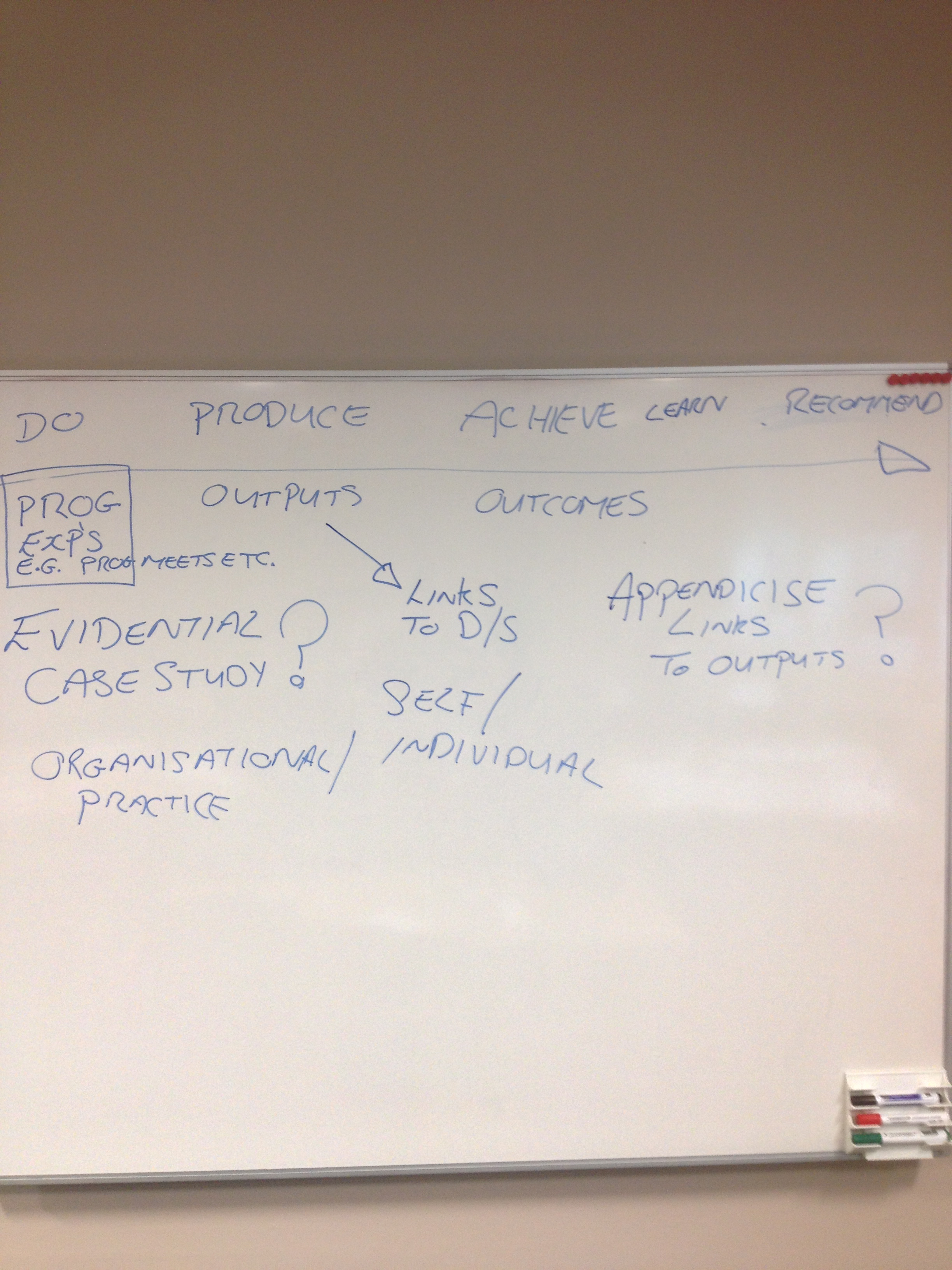
Last up we had projects celebrating their success through the medium of cake, cake, cream teas, lubrication and an installation. Here’s a shot of Joe Nicholls of the DigiDol project describing the cake mix
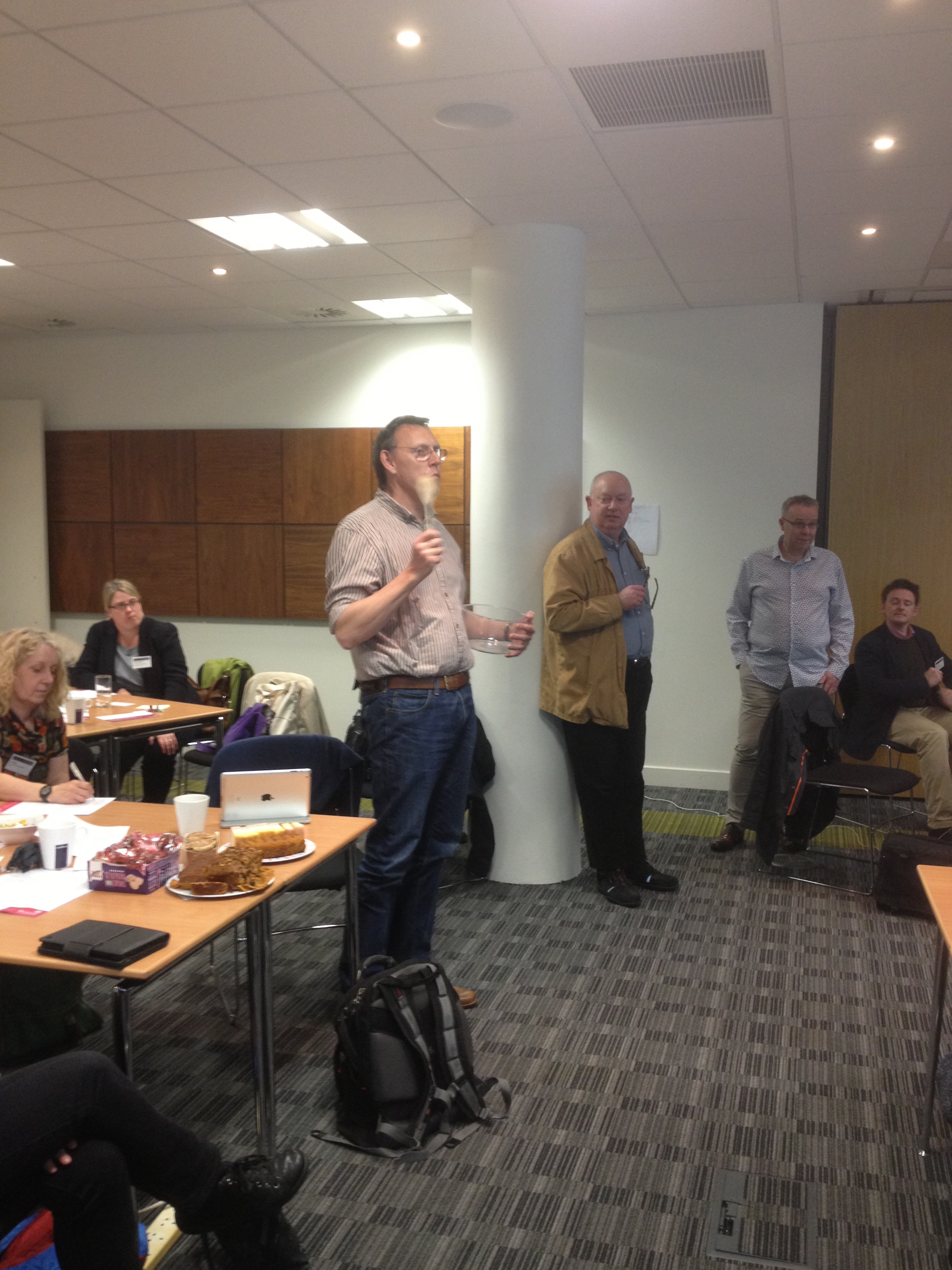
Here’s Professor Neil Witt of Plymouth on Jisc projects and Battenberg
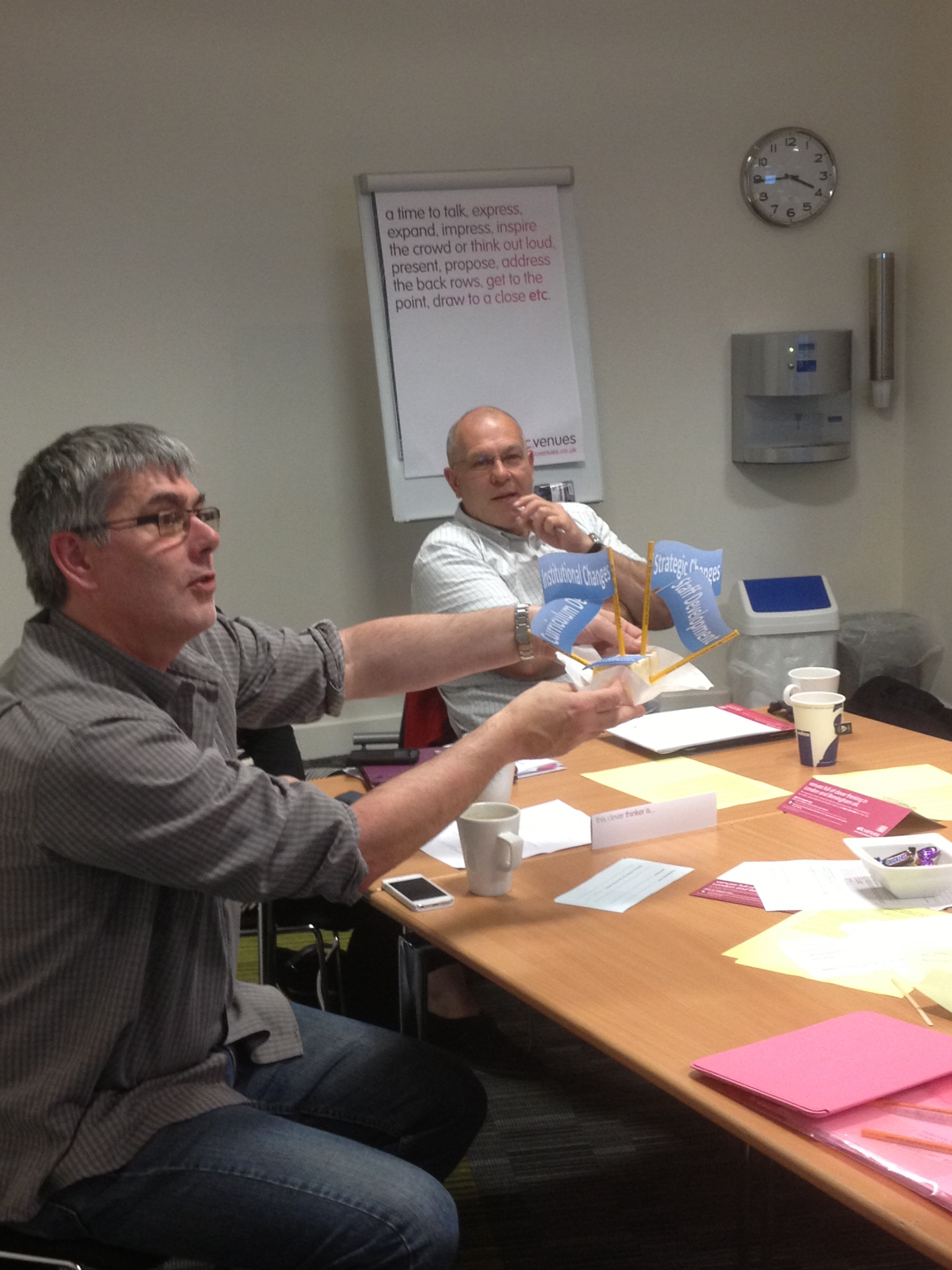
Side conversations
People have approached me to discuss how we maintain the momentum we’ve gathered through the programme. Our conversations have included the concept of widening the net in terms of the professional associations via further joint activities co sponsored and co designed via Values Realisation. We also highlighted the need for resource discovery enhancements in the Design Studio, perhaps via tagging.
Lastly a piece of advice from my train conductor. Buying a single from Wakefield – Sheffield and another from Sheffield to Derby and another from Derby to Birmingham then the three corresponding on the way back is £30 cheaper than the obvious. You live and learn. Shame that was the last of our programme meetings in Birmingham!
Nice work everyone and for associations I’ll be in touch for a progress report over the summer and perhaps a BlackBoard Collaborate session toward the end of the year and end of your funded period. Meanwhile good luck with the dissemination and uptake.
Pingback: SEDA Spring Assessment and Teaching Conference Leeds « Myles Danson
Pingback: #ODHEG with #JISCDigLit — Digital Fingerprint